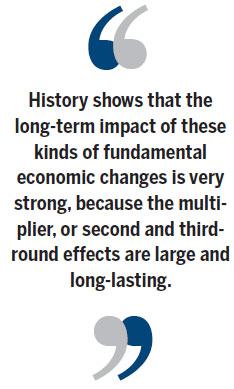China moving up to the next level
Updated: 2014-03-21 08:16
By Giles Chance (China Daily Europe)
|
|||||||||||

Slew of reforms ushered in by new government will have a multiplier effect on economic growth
A friend gave me a copy of a book, China Airborne, by James Fallows. The author was based in China during 2006-09 as a correspondent for the US monthly magazine The Atlantic. Although, as the title suggests, the book's specific subject is China's entry - as a major user and would-be manufacturer - into the modern aerospace industry, the book is really about something else: the nature of China's rise since 1980, and the challenges the country faces as it becomes one of the world's two superpowers.
The book salutes China's remarkable achievements, while documenting the inefficiencies and contradictions of the Chinese growth model. It has been hailed by reviewers as the best inside story yet of modern China.
Fallows describes a China where the incredible happens, but where the state exercises controls over vast swaths of the economy, and blind over-investment proliferates. But Fallows describes a China that is passing from our sight, even though the book was published less than two years ago.
The reason is because, since last year, something big and new has happened in China. A new government is in place, with a clear mission to introduce fundamental reform to China's economy and society. In last November, the day after the Party announced a reform program at the Third Plenum in Beijing, I delivered a lunchtime keynote address at a conference in Shanghai. Earlier that day, equities on the Chinese capital market had fallen, because investors had not digested the full consequences of the reform program announced in outline the day before. But a week after my talk, once the analysts had read carefully between the lines and decided that the government was determined to introduce fundamental change, the stock market had risen by 10 percent.

Since November, much evidence has emerged that China is about to change fundamentally. The establishment of the Shanghai Free Trade Zone will bring banking free market practices to China, because the impact of the zone will spread from Shanghai to the rest of China's financial sector. December's announcement that the government would license 11 private companies as cellular telephone service providers, in competition with the three main operators - China Mobile, China Unicom and China Telecom - introduced a strong element of free market competition to the cellular phone market. The recent announcement that private companies in China will be permitted to start banks will provide more competition in China's banking sector, particularly in the vital sector of small and medium-sized businesses, where loan capital and banking services have been thin on the ground. Other big changes are on the way, such as the full deregulation of interest rates.
The impact of deregulation and more competition in the telecom and banking sectors, within a clear and well-founded regulatory system, will change China's economy for the better in several important ways. In banking, increased competition and the introduction of the private sector will release the vast innovative energies of China's entrepreneurs by providing them with capital and bringing market-led, innovative solutions to China's huge banking market.
Telecommunications will see a similar effect. China's consumers and businesses will benefit from better, more innovative, diverse services. China's communications will become faster and more efficient. Both these sectors are large and vital parts of China's economy.
The impact of the government's changes will spread, and will spur economic growth. The economic reforms ushered in between 1970 and 2000 in the United States, the United Kingdom and other developed countries demonstrated very clearly that free market competition plays a vital role in increasing economic efficiency and growth. The 2008 crash in the US showed the importance of maintaining a strong, fair system of rules within which companies in key sectors like banking can operate and compete.

The new government took office only a year ago, but the reforms introduced so far will have important medium and long-term effects on China. The message from the government to China's state-owned enterprises is that market-based competition is on the way. They will have to become more efficient, and generate products and services which can compete at attractive prices.
History shows that the long-term impact of these kinds of fundamental economic changes is very strong, because the multiplier, or second and third-round effects are large and long-lasting. China has started to change - again, and much for the better. The impact of more competition in key sectors will take a year or two to feed through into stronger growth and greater choice, but by mid-2015 consumers will start to see the first dividends, in more and better-priced services feeding into stronger, more resilient growth, with large and medium-sized enterprises starting to play a more central economic role.
Some state firms will succeed in this new competitive world; others, though, may need to change fundamentally, to redefine themselves and their products. The winner overall will be China, and indirectly all the countries with whom China trades - in other words, the whole world.
China's size means that the inefficiencies and inconsistencies which Fallows describes in China Airborne will continue to exist for some time to come. But the new vigor of China's economy, arising from the deep market-based reforms now being carried out, will quickly spread. These effects will reinforce further reforms, creating a virtuous cycle of change.
The China which China Airborne describes will become a snapshot of a moment along the way in China's journey to superpower status. The results of the reform program which has started will show that China's possibilities are much greater than any outsider could guess at.
The author is a visiting professor at Guanghua School of Management, Peking University. The views do not necessarily reflect those of China Daily.
(China Daily European Weekly 03/21/2014 page12)
Today's Top News
China, the Netherlands seek closer co-op
Crimea is part of Russia
Images may help solve jet mystery
Obamas wowed by China
Xi leaves Beijing for first trip to Europe
Beijing beefs up hunt for missing jet
Putin signs law on Crimea accession
Australia to resume ocean search for missing jet
Hot Topics
Lunar probe , China growth forecasts, Emission rules get tougher, China seen through 'colored lens', International board,
Editor's Picks

|

|

|

|

|

|





